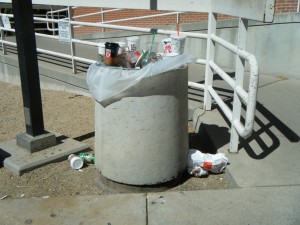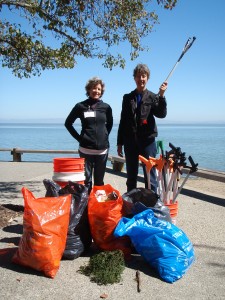Green Sangha has been advocating for plastics reduction since 2004. And we have gotten results: from the saving of over 8 tons of plastic produce bags from Bay Area markets every year, to plastic bag and foam food ware bans in Marin County, to changes in the consumer choices of thousands of Bay Area citizens. 
Allison Vogel has initiated the latest action, something you can do on your own schedule in the course of your day. The idea is simple: saturate our local stores and restaurants with friendly, firm calls to end the use of Styrofoam foodware. We continue to advocate for local ordinances to accomplish this across the board, and eventually a statewide ban. But we can hasten the process by reminding local business persons of their role in making the shift to sustainable packaging and an ethic of reuse.
Allison has written a letter that you can download and bring to restaurants that still use Styrofoam for take-out dishes. Copy this letter, edit it to suit your situation (for example, you may participate in clean-ups at other locations than Damon Slough, mentioned in the letter. Print out a few copies, put them in your backpack or your backseat, and carry them into the restaurant or market you visit.
SAMPLE LETTER
Re: Take-out packaging; going sustainable
I enjoy your food very much, but feel sad when I see polystyrene (Styrofoam and related products) used by customers to take their servings home. I’d like you to consider changing the packaging for to-go orders. Here’s why:
Polystyrene is resistant to photolysis and never completely degrades. It does, however, break into smaller bits which, sadly, look like fish eggs and thus are regularly mistaken for food by wildlife. As a member of Green Sangha, I regularly participate in clean-ups at Damon Slough on the Oakland Shoreline, one of the Bay Area’s “hot spots” for litter pollution. The little bits of polystyrene are by far the most insidious form of litter, nearly impossible to collect.
Polystyrene is harmful to humans. According to the EPA, styrene is a suspected carcinogen. This chemical migrates from foam containers into our food. Heated food, food with fat content, and acidic food are all especially likely to have plastic chemicals leach into them. Workers who are exposed to styrene report acute health effects such as irritation of the eyes, skin, respiratory system, and gastrointestinal tract. Long-term exposure can lead to chronic effects on the nervous system, including headaches, depression, fatigue, weakness, and impairment of kidney function.
Recycling is almost impossible. Although there is a recycling symbol on most polystyrene containers, the EPA reported in 2010 that only 1% of polystyrene was recycled. It is not accepted in citywide curbside recycling because of difficulties in processing the material (sorting, transporting, cleaning, and re-forming into new articles). Many citizens are not aware of these issues and put these containers in their recycling bins with the best of intentions. Unfortunately these items contaminate the system, and must be weeded out and sent to the landfill. Winds often carry these lightweight articles out of garbage trucks and away from the landfill, clogging storm drains and polluting the Bay and ocean.
Leadership. Nearly 200 cities and towns in California have already banned foam foodware, including the Bay Area communities of Alameda, Berkeley, Emeryville, Fairfax, Hercules, Oakland, Palo Alto, San Bruno, and San Francisco. One restaurant in San Rafael charges its customers $1 for orders that require take-out containers. Very few customers have objected; if someone does complain, they explain the reason for the policy, and waive the fee. This allows the business to cover the cost of the slightly-more-expensive compostable containers, to encourage customers to bring their own tiffins for left-overs, and to spread the message of waste reduction in practical and understandable ways.
I urge you to consider these approaches and to talk with your supplier about a green alternative to foam food ware. Copied below are some websites that offer safer biodegradable alternatives to Polystyrene and plastic. (Plastic can only be “downcycled” once and then it, too, is landfill forever.)
If we want to protect our health and our environment, we must stop pollution at its source. I deeply appreciate your consideration of my request and look forward to supporting your business in a way that is non-harming to people and the planet.
Sincerely,
A few Green Product Suppliers
Greenhome.com
Ecoproductsstore.com
Primelinksolution.com
For more information about ending plastic pollution, see www.GreenSangha.org/rethinking-plastics

